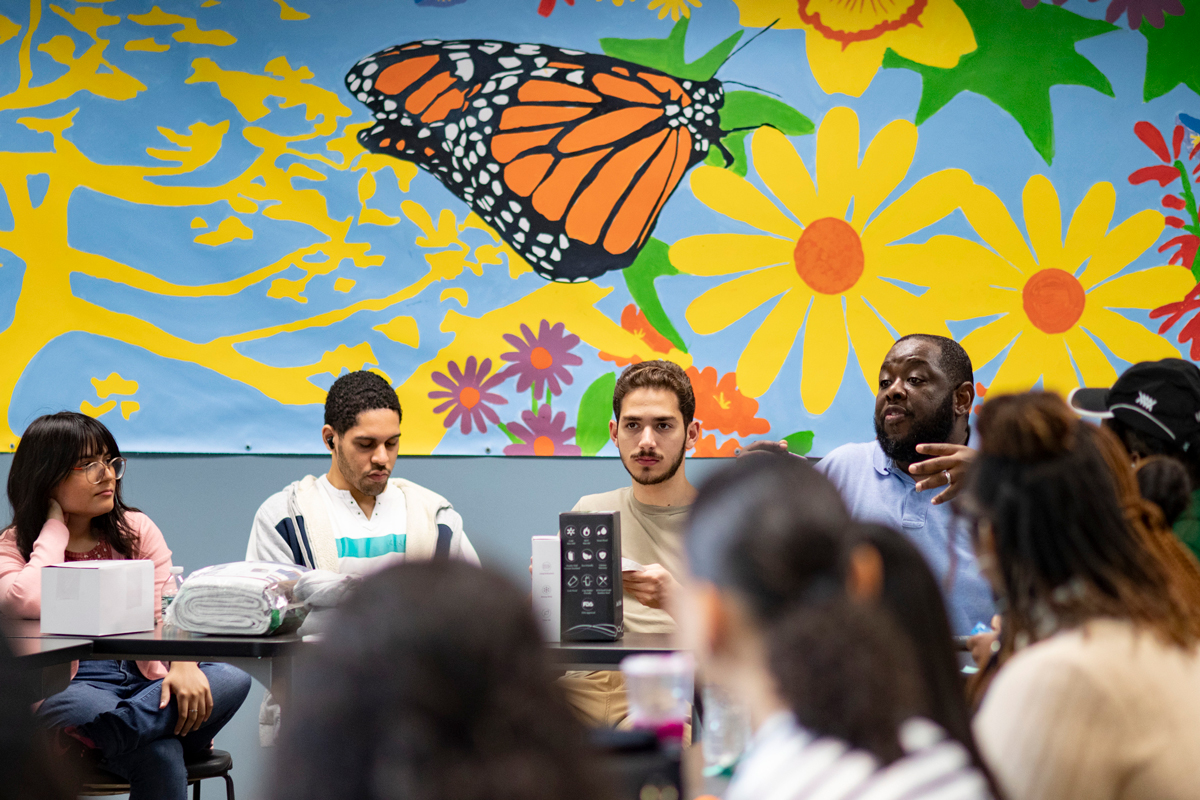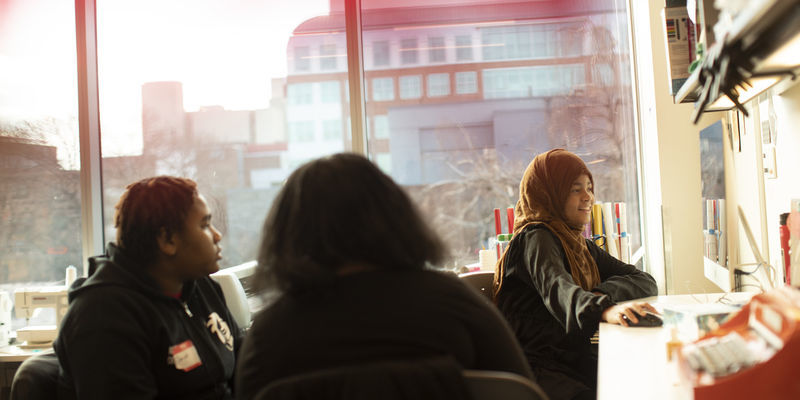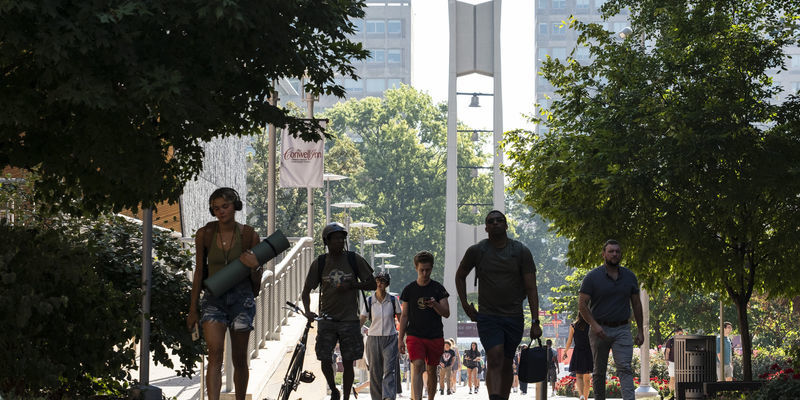Temple’s scholarship program covers full tuition and prepares local youth for college success
Each year the Cecil B. Moore Scholars Program offers full-tuition scholarships for 20–25 high school students who live in North Philadelphia and establishes an academic pathway from high school to college.

For the four years since its inception, Temple University’s Cecil B. Moore Scholars Program has been helping young minds from North Philadelphia secure an academic pathway from high school to college. Now, the program’s first cohort is now on the verge of graduating from Temple University in the spring of 2025.
The Cecil B. Moore Scholars Program provides Philadelphia public school (district or charter) students who live in Temple’s neighboring ZIP codes—19121, 19122, 19123, 19125, 19130, 19132, 19133 and 19140—with a full tuition, four-year scholarship.
“Our Cecil B. Moore Scholars have a concierge relationship with all the services offered at Temple through our program’s director, who monitors each student’s academic progress and guides them to help in whichever way is needed,” said Dan Berman, vice provost for undergraduate studies, who helped conceive the idea for the program. “Our mission is for our neighbors to know that Temple is accessible, affordable and welcoming. We are a transformative home as much for our near neighbors as for students from across the city, state and beyond.”
Each year since its launch in 2021, the program has partnered with educational nonprofit Heights Philadelphia (formerly called Steppingstone Scholars) to provide academic support to around 50 high school seniors selected for a dual enrollment program—a free Temple course—that counts as college credits. Of those seniors, 20–25 students are given the opportunity to become a Cecil B. Moore Scholar and attend a six-week, two-credit summer bridge program, which serves as an introduction to college life, opportunities and resources on Main Campus.
Val Harrison, vice president for diversity equity and inclusion describes the scholarship program this way:
“We have been committed as an institution to remove barriers and level the playing field, so everyone has equal access and sufficient resources to do their best work and be successful in college,” said Harrison. “It’s part of the bigger picture of Temple’s community connections.”
Temple University also recently launched Temple Promise, a last-dollar financial aid grant program for students residing in Philadelphia County with a family adjusted gross income of $65,000 or less who have earned admission to the university. Jose Aviles, the vice provost for enrollment management, said the Temple Promise and Cecil B. Moore Scholarship programs play a key role in increasing institutional diversity and access.
“Similar to Temple Promise, the Cecil B. Moore Scholars Program is an opportunity for us to invest in students right here in our backyard of North Philadelphia. It is another way that we can remove a significant barrier to ensure these students have the opportunity to participate in a world-class four-year college education, regardless of their financial circumstances,” said Aviles.
“One of our top priorities in enrollment management is to focus our efforts and resources toward finding talent in diverse communities. But equally as important as that is supporting those students once they arrive on campus, and that is one of the things that makes the Cecil B. Moore Scholars Program so unique. Students who qualify for that program receive support from the day they enroll through their graduation, and we are seeing how that can be difference maker when it comes to ensuring these students stay on the path toward success.”
The Cecil B. Moore Scholars Program’s infrastructure has led to its inaugural cohort of 17 out of 19 students being on track to graduate within four years from Temple in the spring of 2025. They are performing well in the classroom, too, collectively averaging a 3.06 GPA.
“The combination of the dual enrollment course for high schoolers, summer courses and wrap-around intensive support has led to a high retention rate in the program,” Berman added. “About 95% of students in our program are still at Temple in year two after they started in year one.”
Terrence Seales, the Cecil B. Moore Scholars Program director, guides and supports the scholars from their first year to graduation. He offers bi-weekly check-ins, particularly with first-year students, and encourages them to share their academic progress during appointments. He also implemented a college time management workshop for students after their first two weeks of classes.
“I am accessible and hold them accountable throughout their college journey, which I think helps make a difference in their success to achieve their goals, earn a college degree and apply the skills they learned into the workforce after Temple,” he said.
 Terrence Seales is the Cecil B. Moore Scholars Program director and the associate director of student engagement and access at Temple University. (Photography by Ryan S. Brandenberg)
Terrence Seales is the Cecil B. Moore Scholars Program director and the associate director of student engagement and access at Temple University. (Photography by Ryan S. Brandenberg)
One of the resources on Main Campus he introduces students to is the Student Success Center, located in Charles Library, which offers tutoring and resource support.
“Our summer seminar class also helps them build a connection with each other and relationships on campus,” Seales added. “I often encourage students to connect with Temple’s career center, their school or college advisors, and any additional resources necessary to help them succeed.”
A.J. Pack, a current Cecil B. Moore Scholar who aspires to work as an advertising executive for a major brand, said Temple’s commitment to helping people who live in financially underserved communities receive a higher learning education without the stress of financial burdens has been life changing.
“Many of us in the program are people of color who desire a college education, which was not always attainable, so to remove the financial burdens for us and our parents has been a life-changing experience,” said Pack, a senior on track to graduate in 2025 with a degree in advertising and an account management concentration.
“I appreciate Temple’s commitment to supporting people in the surrounding neighborhood, who are predominantly people of color, to still earn a great college education despite the fact affirmative action in college admissions is now looked at as something in the past,” added the North Philadelphia native.
“Terrence has been a key role model to many of us in the program. He has pointed me in the right direction to help me find college success and graduate on time at Temple.”
Another Cecil B. Moore Scholar, I’shanay Meeks, has had a lifelong passion for nursing and working in pediatrics, driven by a desire to help young people. Meeks is on track to graduate early with a public health degree from Temple in December 2024 and plans to further her studies at Jefferson College of Nursing.
“I grew up with three younger siblings, so it would have put my family in a difficult position for me to obtain a higher education,” Meeks said. “Temple’s scholarship program gave me hope that college is attainable even if your family has financial struggles. I am grateful that the program has allowed me to follow my career passion, earn a college degree and not worry about paying tuition yearly.
“Terrence helped us a lot with his check-ins, going through our grades and assignments and even discussing things outside of school if needed,” added the Strawberry Mansion native. “The overall support system of staff and professors at Temple has been helpful towards my academic success, which is especially needed in college.”
Also read
Meet more of Temple’s inaugural cohort of Cecil B. Moore Scholars.
Visit for more information on how to apply for the Cecil B. Moore Scholars Program.


